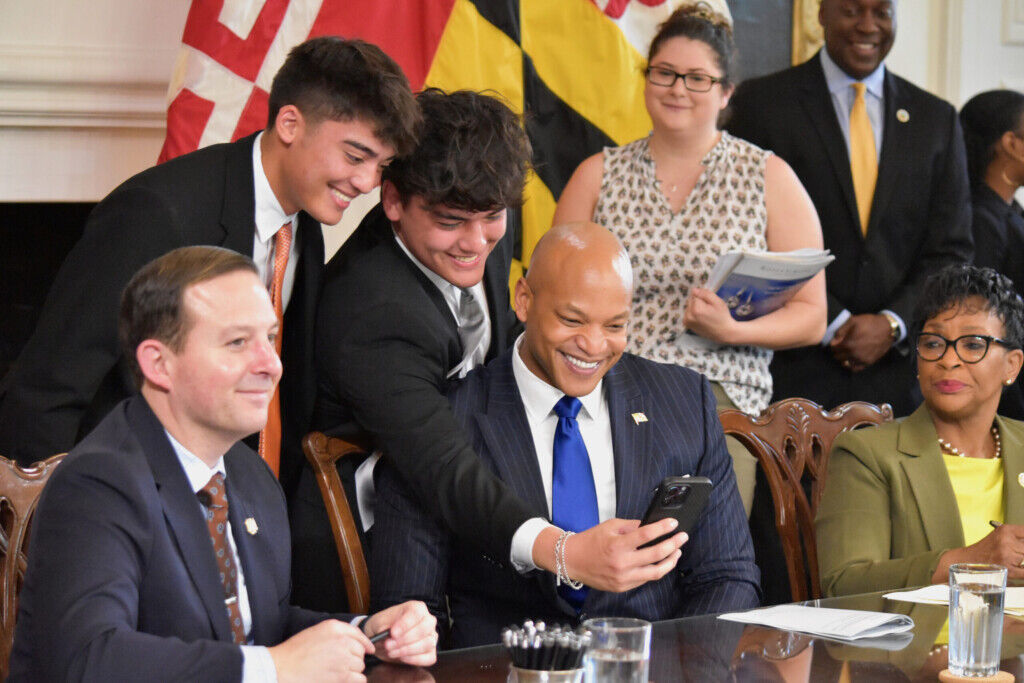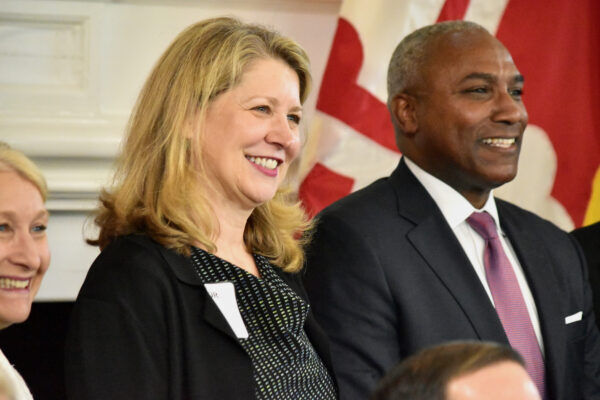
This article was republished with permission from WTOP’s news partners at Maryland Matters. Sign up for Maryland Matters’ free email subscription today.
This content was republished with permission from WTOP’s news partners at Maryland Matters. Sign up for Maryland Matters’ free email subscription today.
Gov. Wes Moore (D) promised to improve the state’s economy and job outlook through a series of bills signed into law Monday.
Moore, flanked by Senate President Bill Ferguson (D-Baltimore) and House Speaker Adrienne A. Jones (D-Baltimore County) signed into law more than 180 bills.
“Today, it’s all about jobs,” said Moore, taking a small shot at his predecessor, Gov. Larry Hogan (R).
“For the past decade our state has been falling behind. And we have made it very clear that saying that you’re open for business is not enough. Being open for business can’t just be a slogan. You need to do the work in order to make that real. Our administration inherited and unacceptable economic situation, but we are going to turn this ship around starting today,” Moore said.
Hogan declared the state “open for business” during his first term in office, a jab at Democrats whom he accused of enacting anti-business policies.
Topping the list of bills signed Monday were a number of economic development priorities including the Innovation Economy Infrastructure Act.
Moore compared the bill to public sector grant funding that went to companies such as KaloCyte. The Baltimore-based company is working to develop an artificial red blood cell substitute product. Moore spoke about the company and Elaine Haynes, president and CEO of the company, during his pre-bill signing remarks.

Haynes, who testified this past session in support of the bill, was given the ceremonial first pen of the bill signing.
“This new blood technology is being developed right here in Maryland, by a Marylander and is being developed with support from the kinds of public sector grants we modeled this legislation after,” said Moore.
Ferguson, the Senate leader, praised the bill as a step in building “a much more economically powerful future” for the state.
“When the governor speaks about the innovation economy, there is no state in the country — not a single state in the country — that has a better moment in time to turn Silicon Valley into the Rust Belt,” said Ferguson. “When you think about things like AI, like quantum computing and nanotechnology, and how that impacts health and the way that we operate and cybersecurity. The assets that we have in the state of Maryland are second to none.”
The governor also signed into law legislation that will use public money to create a fund to assist in the creation of businesses in low- and moderate-income communities.
“We’re working to help small businesses make needed improvements, grow a stronger tech sector, stimulate innovation and help low- and middle-income Marylanders have an equal opportunity to access capital and banking,” said Jones, who leads the House of Delegates. “Maryland is a place where everyone has the same opportunity to be successful regardless of where you live, or what your background is.”
Moore creates Innovation and Impact Council
On Monday, the governor also issued an executive order creating the the Council on Innovation and Impact.
The council of as many as 25 members will focus on finding ways the state can partner with philanthropies, businesses and nonprofits to address social and equity issues as well as volunteerism in the state.
“Today we are making it clear that we are eager to work with anyone who is ready to build a Maryland that leaves no one behind,” Moore said in a statement. “From local leaders to nonprofits and philanthropists, we are going to ensure that everyone has a voice in the process of building the future we want to see here in Maryland.”
Jonny Dorsey, a deputy chief of staff to Moore, will chair the commission.
“In the Moore-Miller Administration, we know that achieving our bold mission – to leave no one behind – will require both excellent performance from our teams in government and collaboration with public-minded leaders across all sectors,” Dorsey said in a statement. “This council is designed to forge these critical strategic partnerships and drive progress. We are excited to come together to test innovative interventions, study what works, and pool private and public funds to scale the solutions we need to make this Maryland’s decade.”
Members of the panel will be appointed by the governor and will not be paid.







